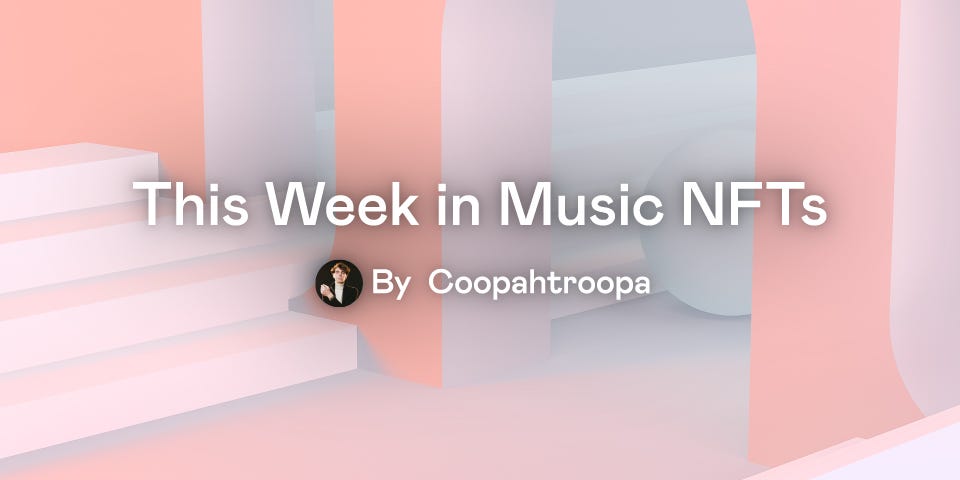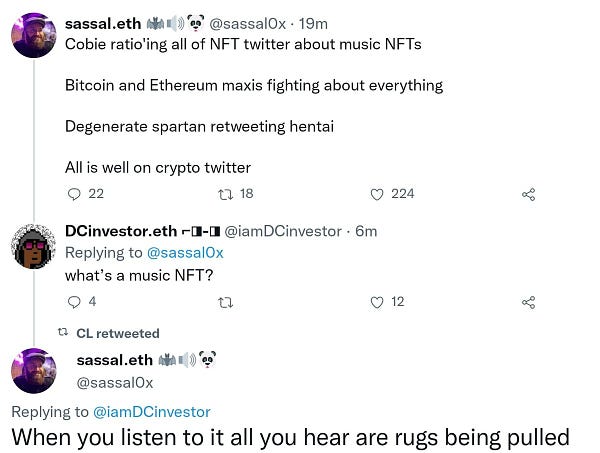This Week in Music NFTs - August 15
Cobie sparks conversation about Music NFTs. Here are the highlights.
Music NFTs became the topic of conversation around how artists should monetize using web3 today.
To summarize - a series of Tweets spurred dialog from prominent founder, trader and investor Cobie around the viability of Music NFTs.


Fun Fact: Cobie was signed to Mercury in his 20s. If anyone has a good understanding of how music actually works - it’s him.
This sparked a wider surge of opinions from the web3 community on Music NFTs.
This week’s edition summarizes the best of them.
First - some thoughts without the Twitter character limit.
Most “Music NFTs” today are altcoins with sound. You mint a song with a fixed number of digital collectibles on a platform like Sound.xyz. People buy those collectibles, some with the intent of supporting the artist, but most with the intent of hopefully selling them for more at a later date.
This is the same behavior we’ve seen in crypto for ages, whether it was ICOs, DeFi tokens or PFPs. If you’re a trader, the primary reason to buy any token is to trade the metagame.
However, not all collectors are traders. 1/1 marketplaces like Catalog offer an alternative. Royalty-backed NFTs on Royal offer a fixed return.
For what it’s worth - I agree with Cobie. The vast majority of Music NFT volume will likely come (and has come) from semi-fungible token speculation, aka limited collectible songs.
There’s a misconception that Music NFTs are meant to replace streaming. This is incorrect. They are simply a net new revenue stream to provide an artist with additional income on top of the existing system. The more streams a song has, the more valuable the Music NFT should be.
Now - why would anyone buy a token of a song that has no rights? For the same reason people buy CryptoPunks, Bored Apes, and to some degree - ETH. To flex that you have the song (status) and hopefully to make money along the way (speculation).
Realistically - very very few people care about flexing songs. But, some really do (I am one of them). Prior to web3, my life was as a curator. I found emerging talent, wrote about them on blogs like ThisSongIsSick and reposted them on SoundCloud. The same behavior still exists, except now I get to collect a token to prove that I actually discovered that song when it was released. In the best-case scenario, my NFTs have been the vehicle through which I formed a genuine relationship with my favorite artist(s).
Music NFTs are not for everyone. There are many problems that still need to be solved.
However - there is a very real culture emerging around it.
Take this newsletter for example. Go back and read all the artists and platforms shaping the movement. It’s not for nothing.
Still - we have a very long way to go before it becomes a niche the broader web3 community (and eventually the world) cares about.
There are a ton of accurate challenges that introducing speculation to songs brings new dynamics to the table that are probably not healthy for most artists. We’re already seeing this and this will continue to be a challenge as we find the new relationship between artists and their collectors.
For now, recognize that any press is good press, and Music NFTs got a huge look this week.
Now it’s up to us to do something about it instead of talking about how it *could* work.
If you’re looking to show someone what the movement sounds like - I spun up a Music NFT Starter Pack playlist on Spinamp.
Happy collecting!
Upcoming Drops
Freshly Minted
Top Tweets
Cobie on the Music NFT Model


Proof Deep Dive on Music NFTs

GCR on Proof of Wealth for Music NFTs

Music NFTs Don’t Exist

Spencer Noon on Artist Royalties

Music NFTs get Inversebrah’ed
Mando on Music NFTs Solving Problems that Don’t Exist

Bonus Reads
This Week in Music NFTs is free to subscribe. To stay ahead of the drama, follow me on Twitter!







